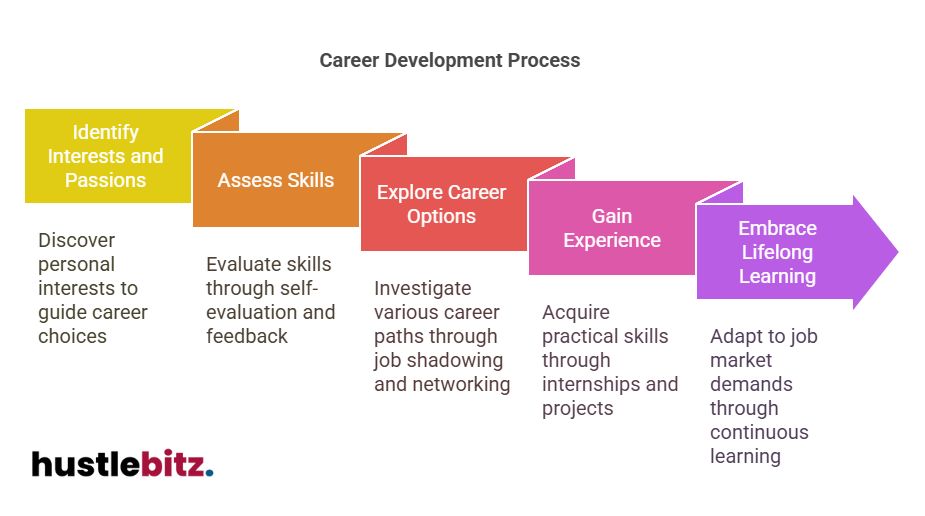Navigating your ideal career path involves a structured approach. Begin by understanding your interests and passions, as these serve as a foundation for meaningful choices. Assess your skills to identify strengths and areas for improvement. Exploring various career options through job shadowing and informational interviews provides practical insights. Researching industries reveals current trends and workplace cultures. Gaining experience through internships or volunteering enhances your skill set and network. Finally, continuous learning and professional development are crucial for career advancement. Each step offers valuable insights that can lead to a fulfilling career journey. Discover more strategies to refine your approach.
Key Takeaways
- Identify personal interests and passions to guide meaningful career choices and decisions.
- Assess skills through self-evaluation and feedback to understand strengths and areas for improvement.
- Explore various career options through job shadowing, informational interviews, and networking events.
- Gain experience via internships, volunteer positions, and freelance projects to build practical skills and networks.
- Embrace lifelong learning through workshops, online courses, and mentorship to adapt to evolving job market demands.

Understanding Your Interests

To effectively identify your ideal career path, it is crucial to consistently assess and understand your personal interests, as they serve as a foundation for meaningful and fulfilling professional choices. Engaging in passion exploration allows individuals to uncover what truly excites them, guiding their career decisions. This journey often begins with hobby identification, where one can reflect on activities that bring joy and satisfaction.
Conducting a personality assessment can further illuminate how your traits align with various professions. This self-awareness is essential for ensuring value alignment between your interests and potential career options. Additionally, strengths analysis can help you pinpoint areas in which you excel, enhancing your confidence as you navigate your career path.
Understanding the type of work environment that suits you is equally important. Some individuals thrive in collaborative settings, while others prefer independent roles. Exploring creative pursuits can also unlock new pathways, as artistic talents may lead to unexpected career opportunities.
Volunteer opportunities can provide valuable insights into your interests, allowing you to gain hands-on experience in various fields. Moreover, employing effective networking strategies can connect you with professionals who share similar passions and interests. Engaging with mentors can amplify these benefits, as they offer guidance based on their experiences.
Ultimately, understanding your interests is a dynamic process that paves the way for a fulfilling career that resonates with your true self.
Assessing Your Skills

Building on the foundation of understanding your interests, assessing your skills is a vital step in determining your ideal career path. Conducting a thorough skill assessment allows you to identify your personal strengths and weaknesses, helping you align your capabilities with potential career opportunities. This evaluation encompasses both technical expertise and soft skills, which are essential in today’s dynamic work environment.
Utilizing self-evaluation tools can provide valuable insights into your career competencies. These tools often include questionnaires or assessments that gauge your skill levels across various domains, revealing both your strengths and any skill gaps that may need addressing. Understanding your transferable skills—those abilities that can be applied across different roles and industries—is also crucial. Such skills enable you to adapt to new environments and challenges effectively.
Incorporating performance feedback from peers, mentors, or supervisors can further enhance your assessment. Constructive feedback can illuminate areas for improvement and validate your existing strengths. This comprehensive approach not only aids in recognizing where you excel but also highlights opportunities for skill development.
Ultimately, an accurate assessment of your skills will empower you to make informed decisions about your career trajectory. By recognizing your capabilities and areas for growth, you can strategically pursue roles that not only align with your interests but also leverage your unique skill set, setting the stage for a fulfilling career journey.
Exploring Career Options
Exploring various career options is essential for individuals seeking to align their skills and interests with suitable professional pathways. This phase of career exploration can significantly clarify which roles resonate most with your aspirations.
Engaging in job shadowing allows you to observe professionals in their daily routines, providing invaluable insight into various positions. Similarly, conducting informational interviews with individuals in fields of interest can unveil the realities of those careers, including necessary skills and challenges.
Participating in networking events can also broaden your horizons, connecting you with industry professionals and peers who share your interests. To further refine your understanding, consider undertaking skill assessments to identify your strengths and areas for growth. This will help you make informed decisions about potential career paths.
Additionally, pursuing passion projects can serve as a practical application of your skills and interests, highlighting what you genuinely enjoy. Exploring volunteer opportunities can offer hands-on experience in different sectors, allowing you to test the waters before committing to a full-time role.
Taking advantage of online courses can help you acquire new skills aligned with current industry trends, making you a more competitive candidate. Lastly, engaging in mentorship programs can provide guidance from experienced professionals, helping you navigate your career journey effectively.
Researching Industries

Researching industries is a crucial step in identifying the right career path, as it enables individuals to understand market trends, company cultures, and the specific skills required for success in various fields. By examining industry trends, job seekers can gauge the labor market’s health and identify sectors poised for growth. Such insights are invaluable for making informed decisions about future career directions.
Networking strategies play a vital role in this research process. Engaging with professionals through informational interviews or attending industry events can provide firsthand knowledge about company culture and the day-to-day realities of different roles. Additionally, job shadowing offers practical exposure, allowing individuals to observe workplace environments and gather insights on required skill sets.
Understanding technological impacts on industries is essential in today’s evolving job landscape. As market demands shift, so do the skills needed to meet them. Pursuing industry certifications can enhance one’s qualifications and demonstrate commitment to potential employers, positioning candidates favorably in competitive job markets.
Moreover, joining professional associations can facilitate connections with mentors and peers who share similar career interests, creating a supportive network for ongoing learning and development. Recognizing growth opportunities within specific industries can help individuals align their skills and aspirations with roles that offer both satisfaction and advancement potential.
Ultimately, thorough research equips individuals with the knowledge to navigate their career paths effectively, ensuring they find roles that align with their values and professional goals.
Gaining Experience

Acquiring relevant experience is essential for individuals to develop the necessary skills and competencies that will enhance their employability in their chosen career paths. Engaging in internship opportunities provides firsthand exposure to industry practices, enabling you to apply theoretical knowledge in real-world scenarios. Similarly, volunteer positions not only contribute to community welfare but also allow you to cultivate valuable skills while expanding your professional network.
Job shadowing is another effective method for gaining insight into specific roles and understanding the day-to-day responsibilities involved. For those seeking flexibility, freelance projects can build a portfolio while offering practical experience in managing client relationships and deadlines. Additionally, pursuing mentorship programs can connect you with seasoned professionals who can provide guidance and support in navigating your career journey.
To further bolster your qualifications, participating in networking events and industry conferences is crucial. These platforms offer opportunities to meet industry leaders, share ideas, and learn about emerging trends. Complementing this with skill workshops and online courses can help you acquire specialized knowledge and certifications that stand out on your resume.
Lastly, part-time roles can serve as practical stepping stones while you explore your interests. By strategically engaging in these diverse experiences, you will not only enhance your skill set but also position yourself favorably in the competitive job market. Ultimately, gaining experience is a multifaceted endeavor that can significantly shape your career trajectory.
Evaluating Job Offers

Evaluating job offers requires a careful consideration of various factors that influence both your professional growth and personal satisfaction.
Begin by conducting an offer comparison to assess the various aspects of each opportunity. Salary negotiation is often a pivotal point; ensure that the compensation aligns with your skills and market standards.
Next, engage in a thorough benefits evaluation. Consider not only health insurance and retirement plans but also perks such as remote work options, professional development funds, and wellness programs. These can significantly enhance your overall satisfaction.
Company culture plays a crucial role in your day-to-day experience. Research the organization’s values and team dynamics to determine if they resonate with your own. This connection can greatly impact your job responsibilities and overall happiness in the role.
Equally important are growth opportunities within the company. Evaluate whether the position allows for career advancement and skill development that aligns with your long-term goals.
Work-life balance is another essential factor; assess the expected hours and flexibility of the role. Additionally, consider your location preference, as commuting can affect your daily routine and stress levels.
Lastly, job security is vital. Investigate the company’s stability and reputation in the industry. A well-rounded evaluation of these factors will empower you to make a well-informed decision that supports both your career ambitions and personal well-being.
Embracing Lifelong Learning
Embracing lifelong learning is essential for professionals seeking to adapt to the ever-evolving demands of the job market and enhance their career prospects. In a landscape characterized by rapid technological advancements and shifting industry standards, continuous education becomes a vital tool for career growth and personal development. Actively engaging in skill enhancement through various avenues can significantly improve one’s employability and professional value.
Online courses have become increasingly popular, offering flexible options for acquiring new skills and knowledge. These platforms cater to a wide range of interests, enabling individuals to explore passion projects while still fulfilling their professional responsibilities.
Furthermore, participating in mentorship programs can provide invaluable guidance and insights from experienced professionals, fostering a culture of adaptive learning.
Networking opportunities are also essential in this journey. Connecting with peers and industry leaders can expose individuals to emerging trends and best practices that may not be covered in traditional educational settings.
Pursuing industry certifications can further validate one’s expertise and commitment to professional development, making candidates more attractive to potential employers.
Final Thoughts
Navigating the journey to find your ideal career path requires a thoughtful approach that balances self-awareness, skill assessment, and active exploration of opportunities. By identifying your interests, assessing your strengths, and gaining relevant experience through internships or volunteer work, you lay the foundation for a fulfilling career. Researching industries and embracing lifelong learning will keep you adaptable in an evolving job market. Ultimately, making informed decisions, evaluating job offers carefully, and continuously improving your skills will ensure long-term satisfaction and success in your career. With these strategies, you can confidently pursue a path that aligns with your personal and professional goals.




